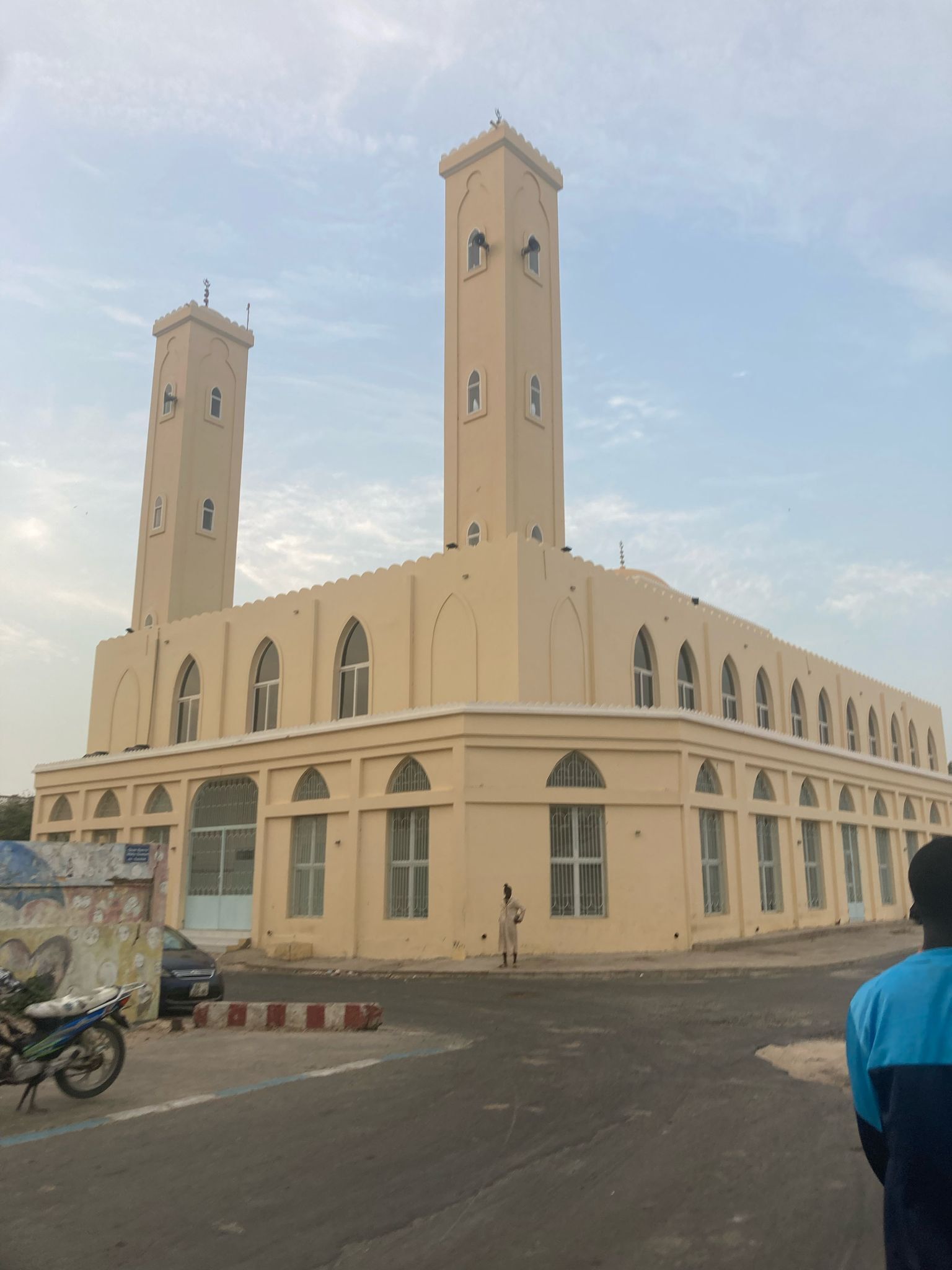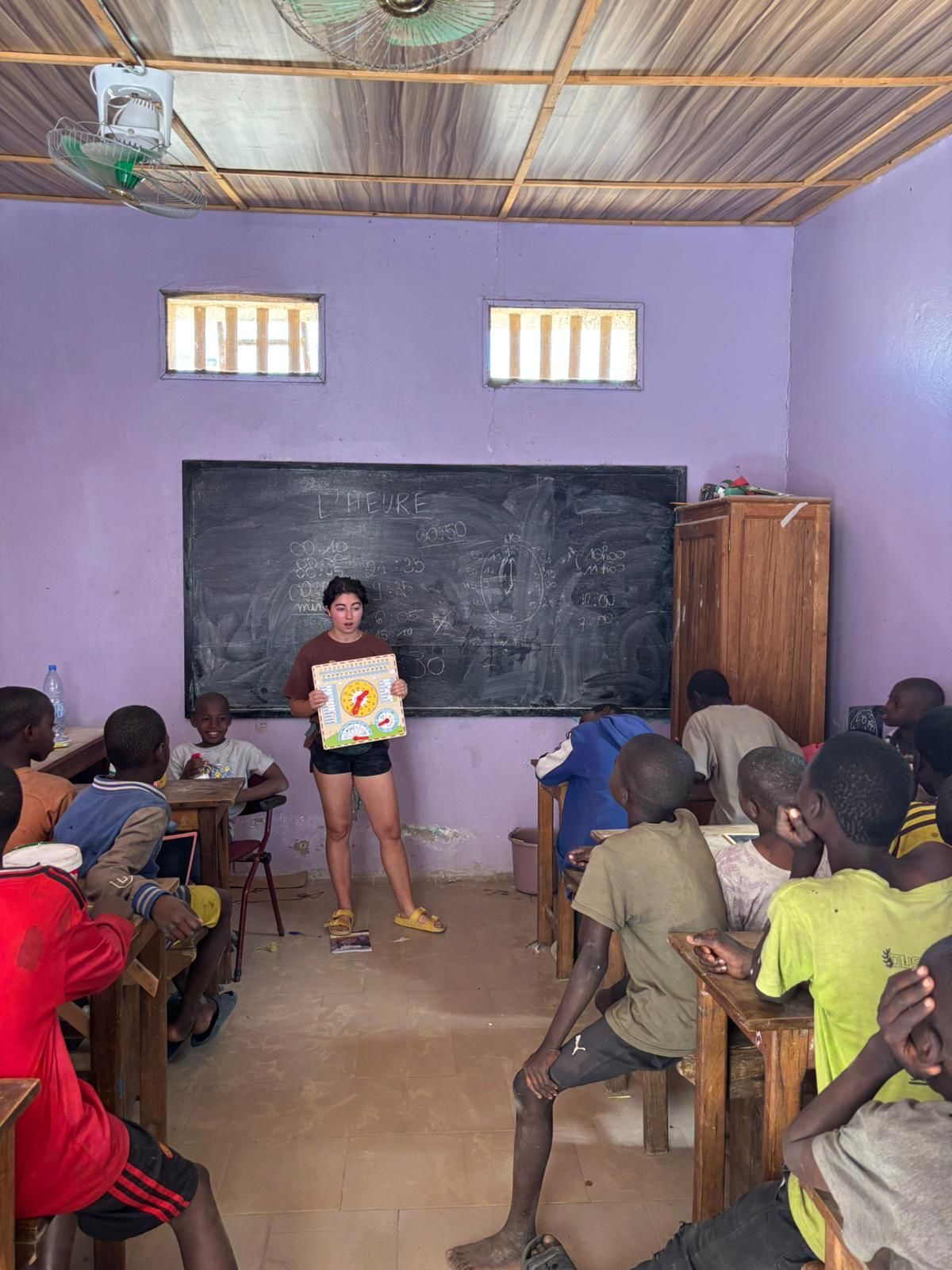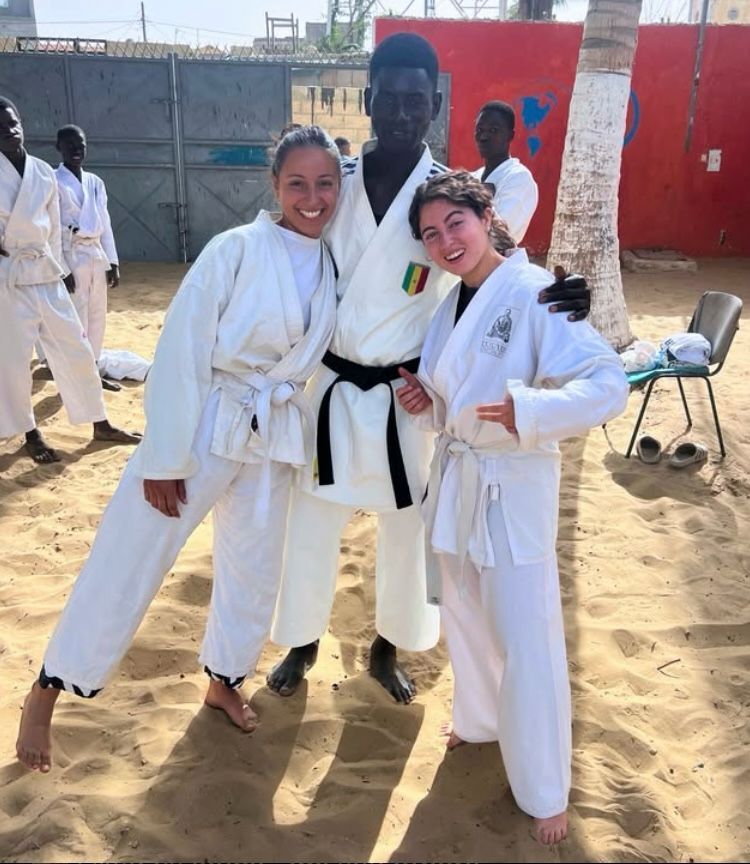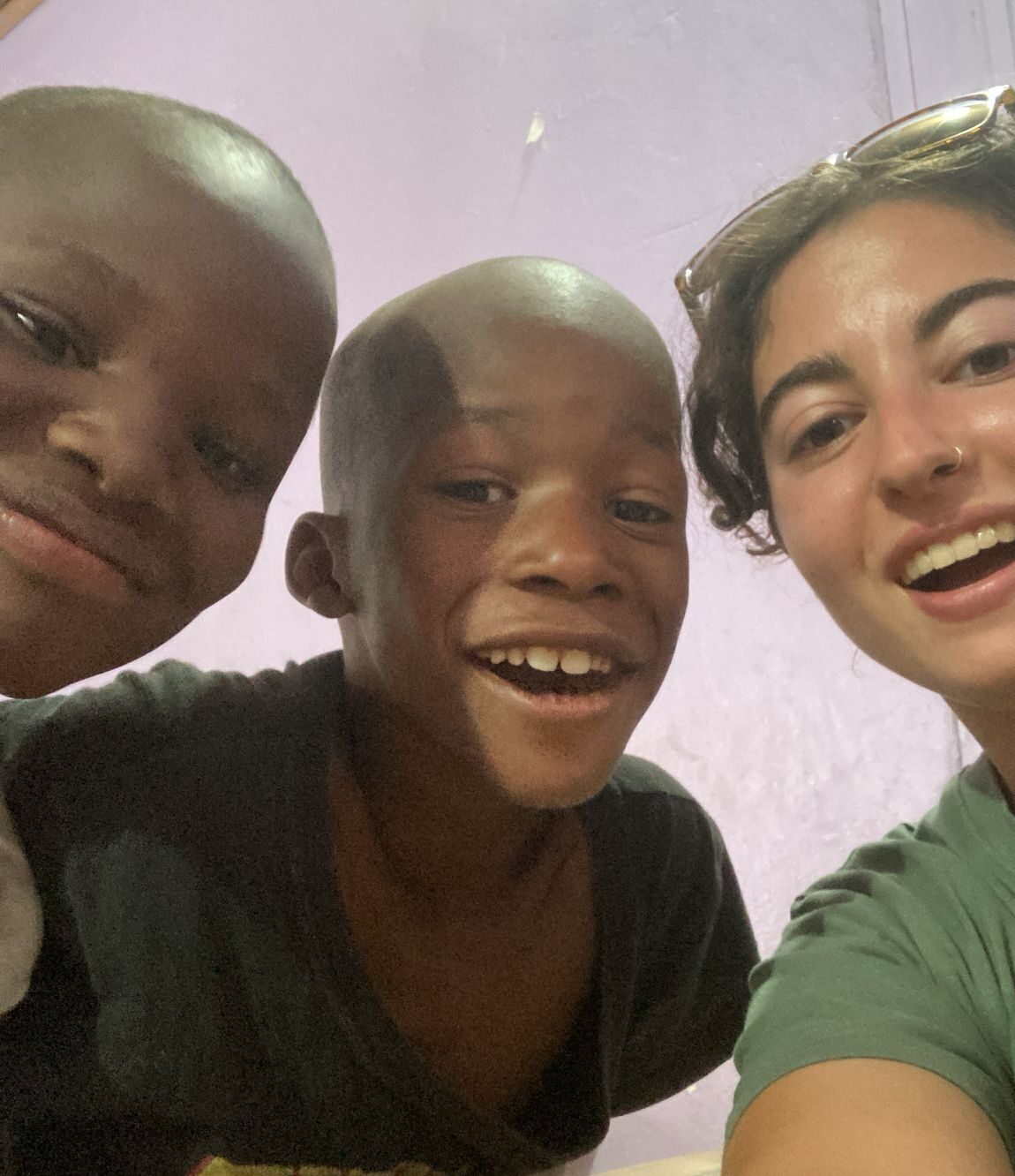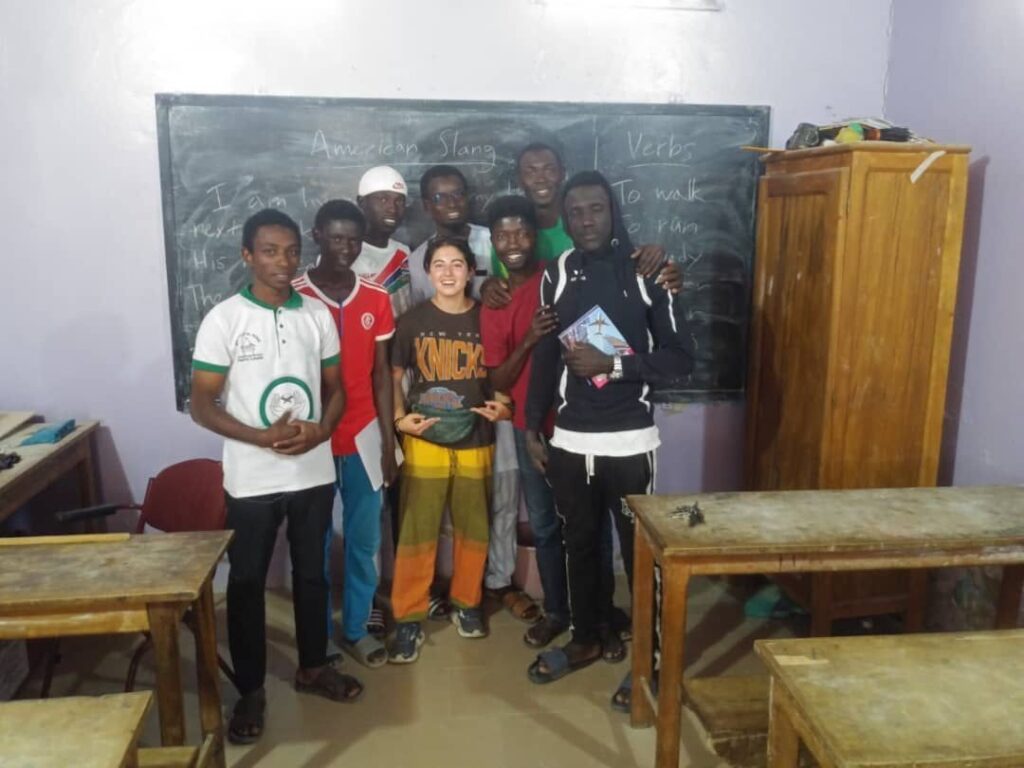
Written by Ava Mendler, 2024-25 Latitudes Student
Living and Volunteering in Saint-Louis
I can’t help but think back to my first day here—stepping out of the DSS airport after 20 minutes of sleep, carrying an (expensively) overweight suitcase, a backpack, and my guitar. I spotted a man holding a sign: “AVA MENDLER – Maison de la Gare,” hopped in the car, and began a four-hour journey to Saint-Louis, my home for the next two months.
Having never been anywhere in Africa before, I was completely captivated by the scenery—desert landscapes, animals of all kinds, Baobab trees (which I quickly learned the name of), and small villages that looked nothing like I had ever seen before.
My host family lives in a huge, bustling neighborhood called Darou. From the moment I walked through the door, I was greeted with hugs, handshakes, and choruses of “Bienvenue!” The family consists of Astelle, her husband Jules, and their kids: fun-loving Soraya (12), soccer- and basketball-obsessed Samba (8), and adorable little Ndaye Astou (4).
In Senegal, people speak Wolof and Pular, but French is the national language, taught in schools. I used French to communicate with my host family and with the staff at Maison de la Gare, as very few people speak English here.
Maison de la Gare is an NGO dedicated to supporting and educating Talibé children in Saint-Louis. In Senegal, it’s common for families to send their young sons to live in Daaras—Islamic schools to study the Quran. These boys sleep, eat, and study under the supervision of Marabouts, but living conditions in many Daaras are poor. Food insecurity and illness are widespread, showers are rare, and most kids wear the same clothes for months. As a result, skin conditions like scabies are rampant.
Marabouts often send boys into the streets to beg for money and may beat them if they fail to return with enough. Many children sleep on the streets out of fear. I had read about the Talibé situation before coming here, but seeing it every day—children in dirty clothes, barefoot, begging—was heartbreaking.
Maison de la Gare provides these children with free education (in French and math), snacks, showers, and even toothbrushes and toothpaste. They also offer afternoon English classes open to the wider community. There’s a yard where the boys can run and play, and what struck me most was the sense of family. Despite their struggles, these kids form strong bonds—and I’ve been so lucky to become part of that.
Monday through Friday, I work at the center from 10 a.m. to 1 p.m., and again from 5 to 7 p.m. In the mornings, I help younger Talibés with French and basic Math. In the afternoons, I co-teach English with Khalidou, one of the kindest people I’ve ever met. He translates my lesson plans into native languages and is fluent in four languages himself! He used to be a Talibé and learned English at Maison de la Gare, and now he’s dedicating his life to giving back. The staff here are incredibly welcoming, and working alongside them has been an honor.
On Tuesday and Wednesday mornings, I also joined visits to the Daaras to help provide medical care. This was completely new territory for me. I slowly learned to recognize medications (everything was labeled in French), and began helping treat scabies, wounds, and eye infections. I didn’t always know what I was doing, but I reminded myself that even imperfect help was better than none.
My experience living and working in Saint-Louis this semester was impactful and more meaningful than I ever could have imagined. Though it came with some challenges, (I will get to those shortly) I believe I’ve learned so much about myself and the way I view the world.
Challenges I Faced
I think being in any foreign country alone comes with its challenges, but there were a few things I really struggled with here. First and foremost, I felt really isolated, and especially at first, I struggled a lot with the language barrier. There were a few other volunteers who came in and out for a bit, who were all from France (shoutout Louna!). It was also extremely hard to see the young Talibé children on the streets every day, torn clothes, begging for food and money. That is just the nature of living here, and it was so sad to see right in front of my eyes.
For most of my time here, I think I was the only white person walking around the streets and in my neighborhood, which gave me a very unique perspective. Sometimes it attracted a lot of attention on the streets and never before had I felt this vulnerable and aware of my whiteness. A lot of people would shout « Toubab! » when I walked by, which is slang for foreigner. After a while, I got used to it, but it was still hard feeling like I stuck out and couldn’t walk anywhere without people talking to me asking to check out their shops. For the most part though, everyone is friendly but just trying to chat/were curious and wanting to know what I was doing here. I picked up some phrases in wolof while here, my favorite being « Sama Kharit » meaning « my friend ». Small phrases in Wolof helped me connect and feel closer to the community.
The Highlights
The highlights of my experience have been working one on one and seeing academic improvement in some of the Talibé children while I’ve been here. It’s rewarding to think I may have helped them learn useful skills. It’s been great feeling like part of the community. The kids call me « Awa », a common Senegalese name similar to Ava. When the Talibés see me out and about they always stop to shake my hand or fist bump. I have loved the working environment at Maison de la Gare, and there is always a chill and relaxed vibe at the center.
One of my favorite moments was playing in a soccer game for the first time with the staff at Maison (we won)! I have loved teaching English with Khalidou, and learning his story. He used to be a Talibé and learned English at Maison de la Gare. He is dedicated to helping these kids and I find his story very inspiring. In addition, never before have I seen students so eager about learning. I am truly inspired and grateful for all of it.
Reflections and Gratitude
Something that has really surprised me about living here is the huge population of Muslims. Muslims make up 97% of the population, and it was (while startling at first,) really cool to hear daily prayer calls. My second month here fell during the time of Ramadan, and I enjoyed learning and observing the traditions that take place here. Another culture shock here is that it is very common for men to have multiple wives, as is permitted in the Quran. It was cool to see how peoples lives are shaped by Islam and the Quran.
Since the beginning of my time here, I would say I’ve grown. I’ve become more aware of my privilege and more grateful for the opportunities I have at home—whether it’s access to education or the ability to afford travel. Most people here can’t afford to travel overseas, and the Talibé children are sometimes unqualified to attend university because they have only studied the Quran at Coranic school. I think I’ve become more independent, and my competence in speaking French has improved significantly… I hope!
I’m most looking forward to sharing stories from my experiences here and sharing the stories I’ve learned from the people I’ve met. I look forward to coming back to Saint-Louis in the future, as it now feels like another home to me—full of familiar faces, people I really want to see again, and will miss a lot.
I am incredibly grateful for the chance to experience Senegal on such a personal, authentic level—to improve my French, and most importantly, to meet people who have truly inspired me. Shoutout to Khalidou, Adama, Issa, Samba, other Samba, Momar, Eladgh, Américan, Madame Taida, and everyone else at Maison de la Gare. You made me feel like part of the family.
P.S. If you ever find yourself in Senegal, you must try the national dish, Thieboudienne. You will never be the same again.
Inspired by Ava’s gap year? Learn more about the Latitudes Year and carve out your own journey!

